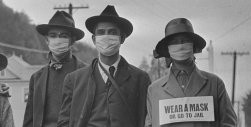On 20-22 October 2021, the RIAS will host a major academic conference on public health and disease in the “American century,” which aims to bring together historians of medicine, US politics, society, and foreign relations, in an attempt to place the COVID-19 pandemic in its historical context. The event will be held online to ensure the participation of US colleagues.
The COVID-19 pandemic has confronted historians with the disruptive power of infectious disease. The impact of the crisis has been multifaceted, global, and immense in its scale and ramifications. For the United States, the experience has been especially confrontational. The US has among the highest rates of infection and the highest number of deaths of any country on the planet. The virus (and the measures taken to contain it) has disrupted almost every aspect of American life, revealed and exacerbated social, economic, racial and political fault lines, and raised major constitutional issues concerning the role of federal and state authorities in maintaining social well-being.
This public health emergency has also set in motion an as yet uncertain set of consequences for the US’s position in the world. President Donald Trump criticised China as the source of the pandemic, and his decision to withdraw funding from the WHO was also an act to push back against Beijing’s controlling influence in that organization. Yet these steps also represented a blatantly nationalist shift, where the former role of the US in bolstering world order through multilateral institutions is being replaced by a boisterous chauvinism. Since January, President Biden has concentrated on recovering the role of the federal government, both domestically and internationally, in taking responsibility for public health.
Historically, this is a pivotal moment. The arrival of the ‘American century’ at the end of the Second World War (for which the seventy-fifth anniversary celebrations were disrupted by the pandemic) also heralded the end of global disease – a view exemplified by Secretary of State George Marshall’s 1948 prediction that the majority of infectious diseases would be eradicated within the twentieth century. Advancements in medical science, harnessed to US economic and military power, produced significant achievements in global public health, from the invention of the polio vaccine to the eradication of smallpox and the utilization of the calorie as a basic unit of nutrition. Yet the prospect of an epidemic-free world has proved illusory. Indeed, disease has made a comeback since the 1970s, as previously unknown afflictions, from HIV to Ebola and COVID-19, moved to exploit the connections, as well as the inequities, of a globalizing world.
This conference seeks to interrogate the American Century through the lens of the US government’s responsibility for improving public health and fighting disease. It takes a broad, parabolic view of the 20th century, book-ending both domestic (the local responses to containing the Spanish flu outbreaks in 1918-1920 and the federal-state contest for control in 2020) and international developments (the Wilsonian blueprint for world order after WWI and the Trumpian abandonment of the WHO in 2020). How does the subject of public health, both domestically and internationally, change our understanding of the American Century and where we are now in the 2020s?
The full program and registration link are available here.
This conference is sponsored by the Province of Zeeland.



